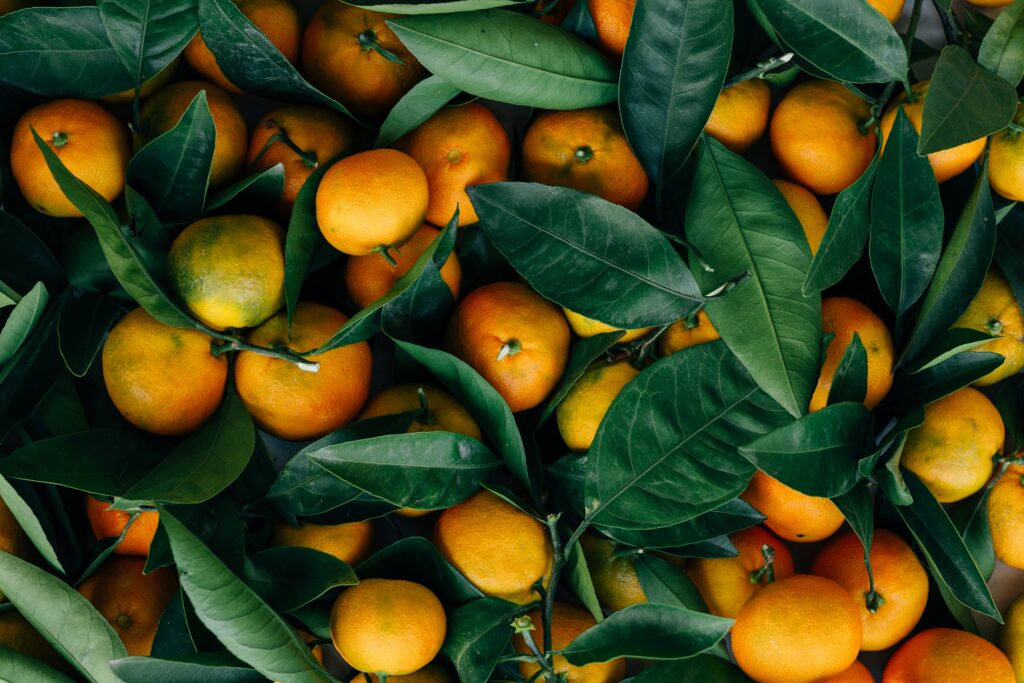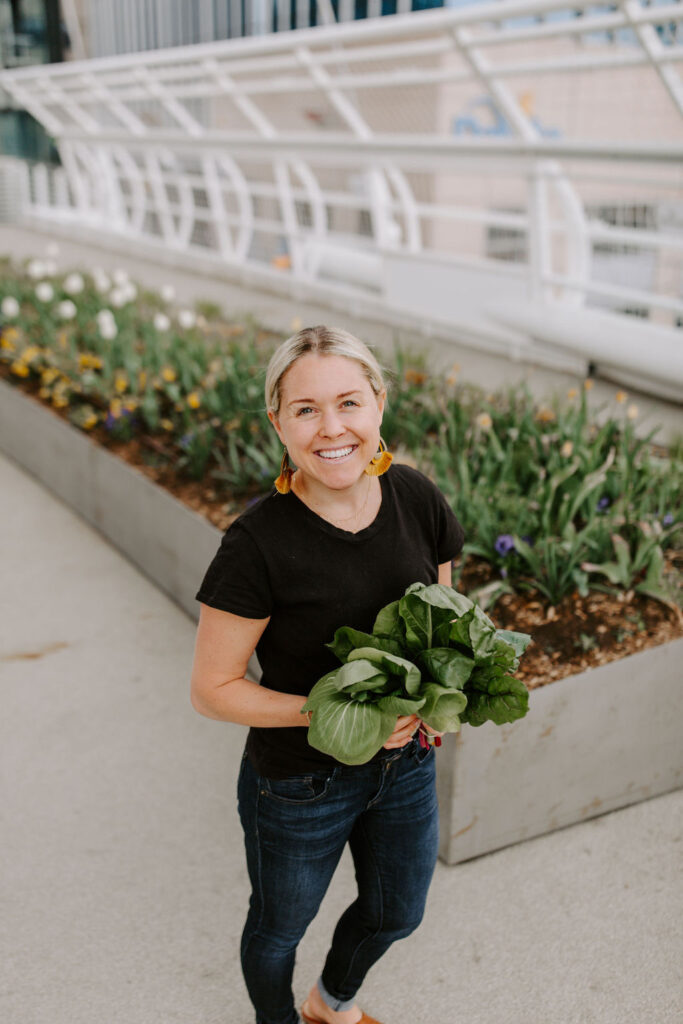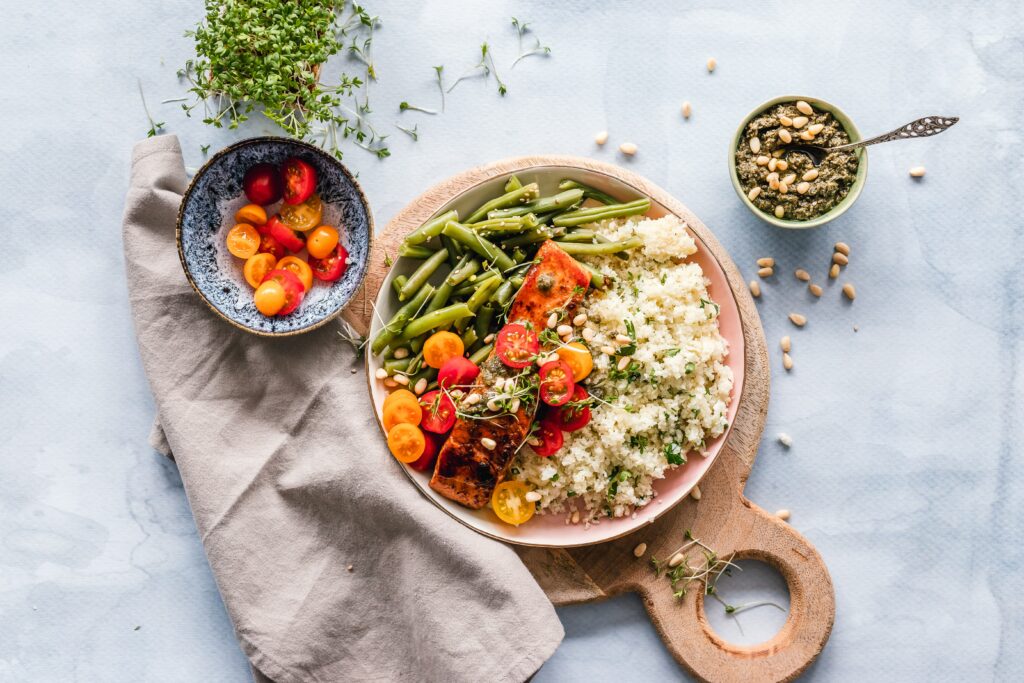When you hear the word organic, what comes to mind? You may associate it with seasonal eating, the wellness industry, or food that’s better for the environment. On the flip side, you may say it’s too expensive and inaccessible. No matter your stance, knowledge is power. As you navigate this growing section of the grocery store, it’s important to know what organic means and how to get the most bang for your buck. What are the benefits of eating organic? And is it worth the price? To begin, we’ll define what organic food is and we’ll end with budget-friendly tips for shopping organic produce.

What Does Organic Mean?
In order for organic agricultural products to carry the certified organic label, they must meet these requirements: food can’t be grown with synthetic fertilizers, synthetic pesticides, or sewage sludge. It can’t be genetically engineered. GMOs are prohibited. Animals must eat organically-grown feed, without animal byproducts. Additionally, animals can’t be treated with synthetic hormones or antibiotics. Last but not least, animals must have access to the outdoors and / or pasture. Specific soil and water quality maintenance is required as well.
Organic regulations differ, globally
The term “organic” refers to the way agricultural products are grown and processed—however, regulations vary across the globe. Many countries have their own organic standards and certification programs. For example, the rules are stricter in Europe. In the United States, organic crops must be grown without the use of synthetic herbicides, pesticides, and fertilizers. They also can’t contain bioengineered genes (GMOs). For organic businesses operating in multiple countries, they must maintain different organic certifications in each country where they operate.

What makes Livestock organic?
Organic livestock is raised in living conditions that mimic the animals’ natural behaviors. For example, they have the ability to graze on pasture, eat organic feed, and forage. They aren’t given anything synthetic. They also aren’t administered antibiotics, growth hormones, or any animal by-products. Furthermore, organic farmers must rotate crops. They also utilize composted animal manures to improve soil nutrient density. More on the importance of soil quality (and its impact on the environment), here.
Is organic food more nutritious?
Short answer: yes. The British Journal of Nutrition found that organic crops have higher concentrations of antioxidants, lower levels of cadmium and nitrates, and fewer pesticide residues than non-organic crops. This particular study analyzed 343 peer-reviewed research papers, which documented nutritional benefits of organic grains, fruits, and vegetables. To date, it’s the most extensive analysis of its kind. Furthermore, another comparative study calculated nutrient contents of organic vs. conventional produce and grains. The results? Higher levels of vitamin C, iron, magnesium, and phosphorus in the organic crops.

How does organic food improve your health?
From observational studies, we know that an increased intake of organic foods is associated with a variety of health benefits. For example, reduced incidence of infertility, birth defects, pre-eclampsia, metabolic syndrome, high BMI, and non-Hodgkin lymphoma. In the meantime, there are a handful of other key benefits associated with organic farming. For example, improved soil health, reduced exposure to pesticide residue, and increased levels of crucial micronutrients.
What are the Benefits of organic food?
As mentioned, organic foods often have more beneficial nutrients—such as antioxidants—than their conventionally-grown counterparts. Additionally, observational studies show that people with allergies (to foods, chemicals, or preservatives) may find their symptoms lessen when they focus on eating organic. At any rate, eating organic has many benefits:
contains fewer pesticides
Chemicals such as synthetic fungicides, herbicides, and insecticides are widely used in conventional agriculture. These residues remain on (and in) the food we eat.
often fresher and more flavorful
It doesn’t contain preservatives that make it last longer. Organic produce is sometimes produced on smaller farms, closer to where it’s sold.
Is better for the environment
Organic farming practices help the environment. They reduce pollution, conserve water, reduce soil erosion, increase soil fertility, and use less energy. Farming without synthetic pesticides is also better for nearby animals, as well as people who live close by.
Livestock is Healthier
When livestock are fed animal byproducts, their risk of mad cow disease increases. And, the use of antibiotics can create antibiotic-resistant strains of bacteria. Beyond organic, it’s worth noting that purchasing grass-fed and pasture-raised livestock provides additional nutritional benefits. Unfortunately, animals who eat an organic diet consume primarily organic corn and grain.
Animal protein is richer in certain nutrients
Results of a 2016 European study show that levels of certain nutrients, including omega-3 fatty acids, were up to 50 percent higher in organic meat and milk than in conventionally raised versions. They’re healthier animals, as a whole. Organically-raised animals are typically given more space to move around. Plus, they have access to the outdoors.

How does growing organic food impact the soil?
Healthy soil provides a consistent release of nutrients to plants. According to the Rodale Institute, soil that contains organic matter is able to hold more air and water. Best of all, healthy soil can sequester carbon. Meaning, it can help combat climate change. Like humans, soil has its own microbiome. In fact, soil and the human gut have a very similar number of active microorganisms. That said, human gut microbiome has only 10 percent of the biodiversity found in soil. When food is conventionally grown—due to synthetic pesticides, herbicides, and fertilizers—the health of our soil plummets. In turn, this may be directly tied to deficiencies in the human microbiome.
Do I always need to buy organic?
In most cases, organic is the optimal choice. After all, it lowers your exposure to chemicals and artificial ingredients. However, it’s important to recognize that eating conventional strawberries is better than eating no strawberries at all! When deciding what to buy organic, begin with the Environmental Working Group’s “Dirty Dozen” list. In the very least, budget to buy these foods organic. Keep in mind that frozen organic produce will almost always be cheaper. Choosing organic seasonal produce is typically more economical, too. Last but not least, prioritize organic meat and produce if you’re currently trying to balance your hormones, improve your gut health, and minimize inflammation in your body.

How to eat organic on a budget
There are a variety of ways to stick to your budget while still creating nutritious, organic recipes. Contrary to popular belief, it is possible to keep your grocery bill low while still fueling your family with nutrient-dense food! Ultimately, it comes down to planning, comparing options, and knowing what’s the best bang for your nutritional buck.
1. MEAL PLAN
Planning your meals can help you avoid buying packaged items you don’t need or fresh veggies that might go bad. Meal planning also helps you avoid eating out on a regular basis.
2. GO MEATLESS
Protein is an essential macronutrient for several functions within the body—muscle growth, tissue repair, hormone regulation, and more. However, the price of meat continues to increase. There are many non-meat protein ingredients that can make a low-cost swap for animal proteins. Think: legumes (beans, lentils, peas), dairy (cottage cheese, etc.), nuts and seeds, and non-GMO soy products.
3. COMPARE OPTIONS
Between e-commerce stores like Thrive Market and Brandless, to discounted organic produce, like Misfits Market, it’s always helpful to spend a few minutes comparing prices. You can also sign up for grocery store apps (like Sprouts) to see what’s on sale. By doing a bit of homework, you can stay within your budget. Last but not least, Budget Bytes has a ton of tips, tricks, and economical recipes.
4. BUY IN BULK
Buying foods in larger package sizes—“in bulk” (or family size)—is often the way to get the lowest unit price. If you haven’t checked the unit price when buying groceries, now is the time. You should see it listed near the item’s price. I love buying ingredients like nut butter, lentil-based pasta, olive oil, and organic meat at Costco. Some of the cheapest ingredients to buy in bulk are beans, rice, frozen vegetables, and bananas.
5. EMPHASIZE WHOLE FOODS
As a helpful rule, first shop the perimeter of the store. This will make you more likely to fill your cart with fruits, veggies, and protein. In other words, whole foods. While processed foods tend to be less expensive than most fresh foods, that is because the U.S. government subsidizes the producers of those main ingredients (i.e. corn and wheat). In turn, that helps keep crop prices low.
6. SHOP THE FROZEN SECTION
Typically just as nutritious as their fresh counterparts, frozen fruits and veggies are less expensive and available year-round. Picked and packaged at their height of ripeness, freezing seals in nutrients (and flavor). With the shelf life being much longer, you can prolong the frozen fruit or veggie’s use. Frozen produce is usually sold in large bags, allowing you to use only what you need and keep the rest in your freezer.
See here for more tips on eating healthy on a budget.

A note on organic research
It’s important to mention that funding for organic research has historically been underwhelming. Finally, in 2020, the USDA dedicated $20 million to organic research—only a sliver of the $2.9 billion research budget. Fortunately, the research on the benefits of eating organic foods is continuing to grow. USDA funding is expected to increase to $50 million by 2023. And, companies like Danone are increasing funding for soil health, regenerative agriculture, and organic foods. These are all wins.
Images by Unsplash.



Leave a Reply